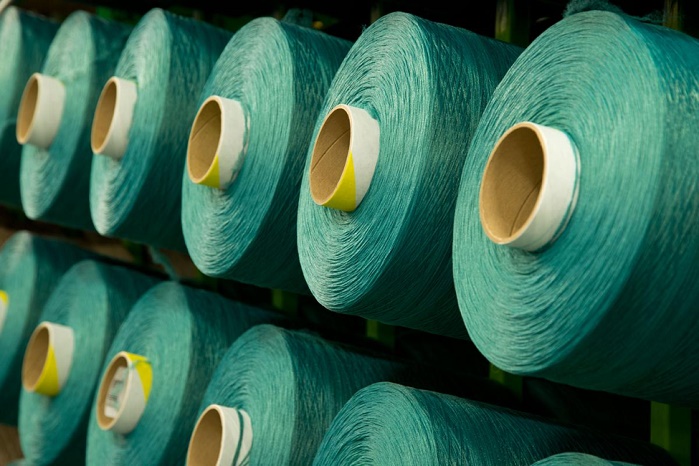
The global fashion industry is facing a sobering contradiction. Even as some of the world’s largest apparel brands proudly champion their use of recycled polyester, the material’s overall share in global production is shrinking. A new analysis reveals that virgin polyester’s relentless growth largely due to the rise of ultra-fast fashion is eclipsing the sustainability progress made by industry leaders.
Between 2019 and 2023, global polyester production grew from 57.7 million tonnes to 71.1 million tonnes, reveals Textile Exchange and Maia Research study. Yet, paradoxically, the share of recycled polyester in this growing pool fell from 13.7 per cent to 12.5 per cent. In simple terms, recycled polyester is growing, but virgin polyester is growing faster and the sustainability balance is tilting backward.
Polyester at a crossroads
Polyester remains the backbone of fashion’s supply chain, accounting for over 54 per cent of global fiber production. Its appeal is clear: affordability, versatility, and durability. However, polyester is also derived from fossil fuels, making it one of fashion’s largest contributors to global carbon emissions.
The shift toward recycled polyester (rPET), mainly sourced from post-consumer PET bottles, was seen as a milestone in reducing dependence on virgin plastics. Yet, the latest data suggests that these efforts are not keeping pace with consumption. “Recycling is no longer enough if virgin fiber growth outpaces it. Without regulatory guardrails, fast fashion will always default to the cheaper option,” says Claire Bergkamp, CEO, Textile Exchange.
Leaders vs. laggards, it’s a divided industry
While global averages paint a grim picture, some brands have shown remarkable progress. Large, established brands have embraced recycled polyester, due to consumer demand and corporate sustainability goals. Companies like Adidas, H&M, and Lululemon have been highlighted for their successful adoption rates of 99.3 per cent, 94 per cent, and 61 per cent respectively. Their commitment has spurred innovation, with new technologies like chemical recycling emerging to improve the quality and consistency of recycled fibers. For example, Indorama Ventures has partnered with other companies to use CO₂-derived materials for new polyester fibers, while others are developing methods to recycle marine waste.
However, the progress of these leaders is being undone by the massive scale and low-cost model of fast fashion. As the Apparel Impact Institute's ‘Taking Stock’ report notes, virgin polyester is cheaper to produce than its recycled counterpart. With no mandates in place to require recycled content, instant fashion players, who prioritize speed and low price, are able to ramp up their use of the cheaper virgin fibers without consequence. This creates a competitive disadvantage for brands that invest more in sustainable materials.
Table: Recycled polyester adoption by leading brands (2024)
|
Brand |
Share of recycled polyester in materials |
Important initiatives |
|
Adidas |
99.30% |
"End Plastic Waste" campaign, investments in chemical recycling and textile-to-textile recycling. |
|
H&M |
94% |
Circular Design strategy, partnership with Syre for textile-to-textile recycling, and a goal to be 100% recycled or sustainably sourced by 2030. |
|
Lululemon |
61% |
rPET-based activewear lines, investment in plant-based fibers, and a multi-year partnership with Samsara Eco for enzymatically recycled materials. |
|
Indorama Ventures (Supplier) |
N/A |
Leading global producer of rPET, with innovations including CO₂-derived polyester and marine waste recycling. |
These leaders are proving that large-scale adoption is possible, but their progress is undermined by the low-cost, high-speed fast fashion model, where the economics are starkly different. Virgin polyester remains significantly cheaper to produce than recycled alternatives, particularly in regions with low fossil fuel costs and limited regulation. This enables ultra-fast fashion players to flood the market with inexpensive garments, free from the costs of sustainability investments.
Market dynamics
While both virgin and recycled polyester markets are growing, the disparity in absolute numbers is striking. Virgin polyester will add over $50 billion in new market value by 2030, compared to only $10.6 billion for recycled polyester.
Table: Polyester market outlook
Metric 2024 Value (USD) 2030 Projected Value (USD) Source Global Polyester Fiber Market Size $77.07 billion $129.97 billion Fortune Business Insights Global Recycled Polyester Market Size $15.52 billion $26.18 billion Grand View Research
Sustainability leaders argue that voluntary commitments are insufficient in the face of an expanding fast-fashion ecosystem. Calls are growing for regulatory frameworks that would make sustainability a baseline rather than an exception.
For example, the European Union’s Strategy for Sustainable and Circular Textiles is widely regarded as a pioneering approach. The provisions include:
Mandatory Extended Producer Responsibility (EPR): Brands must finance collection, sorting, and recycling of textiles.
Eco-design rules: Setting minimum recycled content thresholds and durability requirements.
Ban on destroying unsold stock: Forcing companies to reuse, recycle, or donate unsold goods.
By shifting costs onto all market players equally, the EU hopes to eliminate the competitive disadvantage faced by sustainability leaders. “Circularity will only scale when all companies share the same obligations. Policies like EPR are critical to level the playing field,” notes Katrin Ley, Managing Director, Fashion for Good.
India’s position as an emerging player
India, one of the world’s largest polyester producers, plays a dual role in this paradox. On one hand, it houses some of the world’s largest rPET manufacturers like Reliance Industries, which has invested heavily in recycling PET bottles into textiles. On the other, its fast-growing domestic fast fashion market risks deepening the virgin polyester problem. Without policy mandates similar to the EU, Indian producers and brands may find themselves caught between global sustainability expectations and local cost pressures.
What lies ahead?
The industry now stands at a crossroads. If virgin polyester continues to outpace recycling, the environmental costs will be staggering. Polyester already accounts for nearly 32 per cent of the fashion industry’s greenhouse gas emissions, and unchecked growth could derail global decarbonization targets. However, with policy support, technological innovation, and consumer awareness, recycled polyester could become more than just a niche solution. For now, the paradox remains: progress by leaders, erased by the scale of laggards. Until systemic interventions take hold, the fabric of fashion’s future risks being woven with more fossil fuels than circular fibers.












